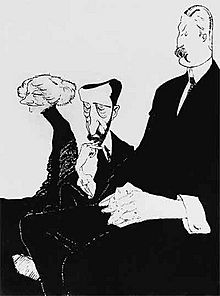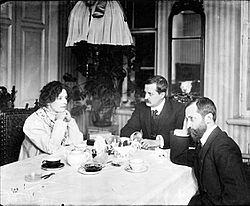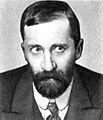Dmitry Merezhkovsky facts for kids
Quick facts for kids
Dmitry Merezhkovsky
|
|
|---|---|
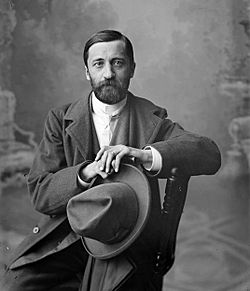 |
|
| Born | Dmitry Sergeyevich Merezhkovsky August 2, 1866 St Petersburg, Imperial Russia |
| Died | December 7, 1941 (aged 75) Paris, Nazi-occupied France |
| Occupation |
|
| Nationality | Russian |
| Alma mater | Saint Petersburg State University |
| Period | 1888–1941 |
| Genre | Poetry, historical novel, philosophical essay |
| Literary movement | Russian symbolism |
| Notable works | Christ and Antichrist (trilogy) |
| Spouse | Zinaida Gippius |
| Relatives | Konstantin Mereschkowski |
Dmitry Sergeyevich Merezhkovsky (Russian: Дми́трий Серге́евич Мережко́вский; August 14, 1866 – December 9, 1941) was a famous Russian writer, poet, and thinker. He was a very important figure in the "Silver Age" of Russian literature. Many people see him as one of the founders of the Symbolist movement, which used symbols to explore deeper meanings.
Merezhkovsky and his wife, the poet Zinaida Gippius, had to leave Russia twice because of their political views. During his second time living outside Russia (from 1918 to 1941), he kept writing popular novels. He also became known for criticizing the Soviet Union. Merezhkovsky was nominated nine times for the Nobel Prize in literature. He almost won in 1933. After World War II, he was largely forgotten because of his controversial political connections.
Contents
Dmitry Merezhkovsky's Life Story
Dmitry Sergeyevich Merezhkovsky was born on August 2, 1866, in Saint Petersburg, Russia. He was the sixth son in his family. His father, Sergey Ivanovich Merezhkovsky, was a high-ranking government official. His mother, Varvara Vasilyevna Merezhkovskaya, loved art and books. Dmitry later said his mother was the most important person in his childhood. She was a kind and beautiful woman.
Growing Up and Early Writing
Dmitry spent his early years on Yelagin Island in Saint Petersburg. His family had a summer house there. They also owned a large estate in Crimea. His father lived a simple life and taught his children to avoid luxury. An old German housekeeper, Amalia Khristianovna, told Dmitry many Russian fairy tales and Bible stories. These stories helped him develop strong religious feelings when he was a teenager.
In 1876, Dmitry went to an elite grammar school. He later called his time there "murderous." When he was thirteen, he started writing poetry. He was very interested in the plays of Molière. He even started a Molière club at his school. This group had no political goals, but the secret police still became interested. Dmitry's father helped prevent him from being expelled.
First Published Works
Dmitry's father was the first to notice his son's poems. In 1879, he introduced Dmitry to Princess Yekaterina Vorontzova. She liked his poems and encouraged him to keep writing. However, a meeting with the famous writer Fyodor Dostoyevsky went differently. When Dmitry read his work, Dostoyevsky said, "Poor, very poor. To write well, one has to suffer. Suffer!" Dmitry was very frustrated by this.
Merezhkovsky's first poems, "Little Cloud" and "The Autumn Melody," were published in a Saint Petersburg magazine in 1879. A year later, another poem, "Narcissus," was included in a book to help students.
In 1882, Merezhkovsky became close friends with the poet Semyon Nadson. Nadson was his only friend besides his mother. Nadson died in 1887, and his mother died two years later. Dmitry felt very sad and fell into a deep depression.
By 1896, Merezhkovsky was known as a poet. Later, when he became famous for his novels, he felt a bit embarrassed by his early poems. Still, his poems remained popular. Some famous Russian composers, like Rachmaninoff and Tchaikovsky, even set many of them to music.
University Studies and New Ideas
From 1884 to 1889, Merezhkovsky studied history and languages at the University of Saint Petersburg. He learned several foreign languages and became interested in French literature and philosophy. However, he didn't enjoy his university years much. He felt he never had a proper education.
In 1884, he joined the Saint Petersburg Literary Society. Here, he met many established writers. He also met Nikolay Mikhaylovsky and Gleb Uspensky, who were important thinkers. Merezhkovsky traveled through Russian provinces with Uspensky. He met leaders of religious groups and discussed the meaning of life. He even thought about becoming a teacher in the countryside.
Mikhaylovsky introduced Merezhkovsky to the magazine Severny Vestnik. Here, he met future leaders of the Russian Symbolism movement. Merezhkovsky's first article for the magazine, "A Peasant in the French literature," showed his interest in "mysticism," which Mikhaylovsky didn't like.
In early 1888, Merezhkovsky graduated from university. He then traveled through southern Russia. In Borjomi, he met 19-year-old poet Zinaida Gippius. They fell in love and married in Tiflis on January 18, 1889. They became one of the most important couples in Russian literature.
Literary Breakthrough and Symbolism
Merezhkovsky's first major book, Poems (1883–1888), was well-received. He also published a long poem called Protopop Avvacum. However, these books didn't solve his financial problems. His wife, Gippius, started writing many novels to help.
Dmitry became very interested in Greek drama. He translated plays by Aeschylus, Sophocles, and Euripides. These translations are now considered very important in Russian classical translation.
In the late 1880s, Merezhkovsky started writing literary criticism. His essays on famous writers like Pushkin and Dostoyevsky were new and exciting. They were later collected in a book called The Eternal Companions. This book became a classic and was even given as a special gift to top students.
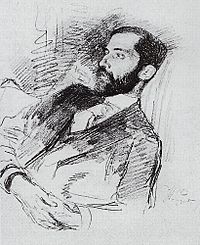
In 1892, Merezhkovsky's second poetry book, Symbols. Poems and Songs, came out. It showed influences from Edgar Allan Poe and Charles Baudelaire, along with Merezhkovsky's new religious ideas. This book became popular with younger readers.
In October 1892, Merezhkovsky gave a lecture called "The Causes of the Decline of the Contemporary Russian Literature and the New Trends in it." He said that modern art used "Mystic essence, Symbolic language and Impressionism." He argued that Russian Modernism was a continuation of classic Russian literature. This lecture, along with his book Symbols, became an early declaration of Russian Symbolism. Many people didn't like it, but a small group of writers welcomed his ideas.
Merezhkovsky published many books in 1893–1894, including plays and translations. He started working on his first novel, The Death of the Gods. Julian the Apostate.
Major Novels and Religious Ideas
The Death of the Gods, published in 1895, was the first book in his Christ & Antichrist trilogy. It is considered the first Russian symbolist novel. Some critics didn't like it, but others loved it. Five years later, it was published in France.
His second novel, Resurrection of Gods. Leonardo da Vinci, came out in 1900. These books were praised for showing the strong differences between social life and spiritual values.
By this time, Merezhkovsky was part of a new cultural group around the magazine Mir Iskusstva (World of Art). Here, he published his famous essay, L. Tolstoy and Dostoyevsky. He even visited Lev Tolstoy in 1904, but they didn't truly get along. Merezhkovsky continued to criticize what he saw as Tolstoy's "nihilism."
In the early 1900s, Merezhkovsky and Gippius started a group called the Religious-Philosophical Meetings. They wanted to create a "New Church" that would be different from the old Orthodox Church. This group aimed to discuss religious and cultural problems and promote "neo-Christianity." They also started their own magazine, Novy Put (New Path).
The Meetings were eventually stopped by the government in 1903. Merezhkovsky and Gippius later left Novy Put. In 1907, the Meetings started again as The Religious-Philosophical Society.
The couple also formed their own small "church" at home. They tried to involve their friends. Dmitry Filosofov joined them, forming "The Brotherhood of Three." They had unusual religious ceremonies.
In 1904, Peter and Alexis, the third novel in the Christ and Antichrist trilogy, was published. It focused on Peter the Great as an "embodied Antichrist." This idea was shared by some Russian religious groups. By this time, Merezhkovsky was a best-selling author in Europe.
Revolutionary Ideas and Exile
After the Bloody Sunday event in 1905, Merezhkovsky's views changed. He saw the Imperial Russian Navy's defeat by Japan as a sign of the Russian monarchy's "anti-Christian nature." He saw the 1905 Revolution as a step towards a religious change. He supported the protests and wrote poems for the revolution.
In 1906, Merezhkovsky and Filosofov went to Europe. They wanted to promote their "new religious consciousness." In France, they started a magazine called Anarchy and Theocracy. Merezhkovsky believed that revolution in Russia was unavoidable. He thought it could only succeed if people had a "revolution of the human spirit." Otherwise, he warned, it would lead to tyranny.
In 1908, Merezhkovsky's historical play Pavel the First was published. It was about the nature of the Russian monarchy. The Russian authorities banned it. This play was the first part of a new trilogy called The Kingdom of the Beast. The other two parts, Alexander the First and December 14, came out in 1913 and 1918. These historical novels are seen as the peak of his writing career.
World War I and the Revolutions
In 1914, World War I began. The Merezhkovskys were doubtful about Russia joining the war. Merezhkovsky tried to stay out of politics, but in 1915, he joined a group that wanted Russia to leave the war peacefully.
Two of his new plays, Joy Will Come and The Romantics, were staged during the war. The Romantics was a success. Merezhkovsky felt that Russian literature was still against him.
1917 was a very political year for the Merezhkovskys. Their apartment became a meeting place for political discussions. Merezhkovsky welcomed the February revolution that ended the monarchy. But by summer, he was disappointed with the new government. He predicted that the Bolsheviks would take over, which happened in October.
Merezhkovsky saw the October Socialist Revolution of 1917 as a disaster. He believed it was a victory for evil, threatening human civilization. He and Gippius tried to help their arrested friends. Ironically, the Soviet government lifted the ban on his anti-monarchist play Pavel Pervy, and it was performed in many theaters.
In 1919, the Merezhkovskys decided to leave Russia. They left Petrograd on December 14, 1919. They got permission to leave by saying they would give lectures on Ancient Egypt to Red Army soldiers.
Life in Exile
Merezhkovsky, Gippius, and their secretary Zlobin first went to Minsk, then Vilno. They gave interviews and lectures in both cities.
In Warsaw, Merezhkovsky worked with Russian immigrant groups. He saw Poland as an important place to stop the spread of Bolshevism. He even met with Polish leader Józef Piłsudski. Merezhkovsky called on Russians to join the Polish army against the Bolsheviks. But Poland and Russia made peace, so the plan failed. The Merezhkovskys left for France.
In Paris, Merezhkovsky started a group called the Religious Union. He gave lectures and wrote for newspapers, speaking out against the Bolsheviks. However, he felt isolated. The left didn't like his call for international action in Russia, and the right didn't like his rejection of restoring the Russian monarchy. His only ally was Ivan Bunin. They worked together to get financial support for Russian writers from the French government.
In 1922, a collection of articles by Merezhkovsky, Gippius, and others came out. It was called The Kingdom of Antichrist. The book argued that the "Russian fires" (the revolution) were global and would bring "either brotherhood in slavery or the end in a common grave" for European nations.
In 1925, Merezhkovsky and Gippius formed a literary and philosophy group called the Green Lamp. This group became an important cultural center for Russian intellectuals living outside Russia. Merezhkovsky said their mission was to be "the Criticism of Russia," judging its present and seeing its future.
In 1928, King Alexander I of Yugoslavia honored Merezhkovsky for his contributions to world culture. However, things became harder in the early 1930s. Funding from Czech and French sources stopped. Merezhkovsky then found support from Benito Mussolini, the leader of Italy. Mussolini was very interested in Merezhkovsky's work.
Later Writings and Controversial Views
In the mid-1920s, Merezhkovsky returned to writing religious and philosophical essays. He wrote books like The Birth of Gods. Tutankhamen in Crete (1925) and Messiah (1928). He explained that he used the past to search for the future, seeing the present as a kind of "exile."
He also created another trilogy of books. The Mystery of the Three: Egypt and Babylon (1925) was followed by Mystery of the West: Atlantis-Europe (1930). The third book, Unfamiliar Jesus (1932), is considered one of his strongest.
Merezhkovsky became a strong candidate for the Nobel Prize in Literature. From 1930 onwards, a professor named Sigurd Agrell nominated him many times. However, he was often nominated alongside Ivan Bunin. Bunin won the prize in 1933. Merezhkovsky's chances became slimmer each year. He continued to write until his death, trying to finish his Spanish Mysteries trilogy.
Merezhkovsky was a Russian-focused thinker. He believed Russia had a special place in world culture. He always looked for a "strong leader" who could lead a fight against Communism. For a while, he thought Benito Mussolini was this hero. Mussolini sponsored his book on Dante and had many talks with Merezhkovsky. Merezhkovsky even wrote an article called "Meeting Mussolini." However, Mussolini became uncomfortable with Merezhkovsky's ideas and distanced himself.
Merezhkovsky then tried to contact General Francisco Franco in Spain, seeing Spain as the last anti-Communist stronghold. When that failed, his focus shifted to Adolf Hitler. Merezhkovsky never saw Fascism as a good alternative to Communism. He wrote in 1930 that Europe was stuck between "two stores of explosives: Fascism and Communism." He hoped these two evils would destroy each other. However, he saw the danger of Hitler taking over Europe as less bad than the spread of Communism.
This was the only thing Merezhkovsky and his wife, Gippius, disagreed on. Gippius hated Hitler. Merezhkovsky thought Hitler could fight the "Antichrist Kingdom" (Communism). This was more important to him than the fact that his own book, Joan of Arc (1939), was banned in Germany.
In 1939, Paramount Pictures bought his script The Life of Dante, but production was canceled when World War II started. The Merezhkovskys moved to Biarritz in southern France to escape air raids.
In June 1940, the German army occupied Biarritz. On August 14, 1940, Merezhkovsky's 75th birthday was celebrated. It was here that he made comments that some people later said were his "infamous German radio speech." However, it's believed this "speech" was actually a fake created by Nazi propagandists. He was known for his strong anti-Communist views, which sometimes led him to controversial associations.
Dmitry Merezhkovsky's Death
For the last three months of his life, Merezhkovsky worked constantly in his Paris apartment. He was trying to finish his book Little Theresa. On December 6, 1941, he went to his room early. The next morning, his maid found him unconscious. He died in half an hour from a brain hemorrhage. He was buried at the Sainte-Genevieve-des-Bois Russian Cemetery in France.
Merezhkovsky's Ideas
Merezhkovsky first followed the idea of positivism, which focused on scientific facts. But he soon turned to religion. He combined European positivism with Russian Orthodox ideas. He wrote a paper called "On the Causes of the Decline and the New Trends in Contemporary Russian Literature." This paper gave the Russian Symbolist movement its ideas and name. Merezhkovsky was the first in Russia to talk about symbols as a way to understand modern art.
He believed in "rejecting the rational in favour of the intuitive." He thought that symbols were the best way to describe reality, which was otherwise hard to understand.
Merezhkovsky's Impact
Throughout his life, Dmitry Merezhkovsky caused strong reactions in Russia. Some praised him, while others criticized him. He was known for his great knowledge, scientific approach to writing, and unique style. He was seen as one of the most educated people in Saint Petersburg in the early 1900s.
Merezhkovsky was the first in Russia to explain the main ideas of Symbolism and Modernism. He helped define these movements. He also added a new, "thought-driven" dimension to historical novels, making them a modern art form. He influenced many famous writers like Andrey Bely and Mikhail Bulgakov. He introduced ideas like "modernist novel" and "symbolic historical novel" to Russian literature.
He was also praised as an engaging essay writer. Some critics didn't like that he repeated ideas, but others admired how he used them like musical themes in a symphony.
His philosophical, religious, and political ideas were also very influential, though often controversial. Many writers, political figures, and philosophers were interested in his theories. Thomas Mann called Merezhkovsky a "genius critic."
Later researchers noted that Merezhkovsky was willing to question old ideas and traditions. He wasn't afraid of controversy. He searched for ways to overcome the crisis he saw in the traditional Russian Church.
Criticism of Merezhkovsky
In Russia, many people didn't like Merezhkovsky's work. Critics said his writing was for a small, educated group and "closed for the uninitiated majority." Some said he isolated himself from real life and built an "inner temple" for his own use.
Even though he used a scientific approach, many academics saw him as a talented trickster. They thought he rewrote history to fit his own ideas. His old friends often left him because he seemed inconsistent.
Despite his religious beliefs, Merezhkovsky was not popular with the Russian Orthodox Church or other religious thinkers. He was also not popular with leftist writers.
His work published after he left Russia was seen by Soviet critics as a sign of "ideological degradation." Maxim Gorky, a famous Soviet writer, called Merezhkovsky a "small man" whose writing was "soul-less and boring." In Soviet times, his works were unofficially banned until the early 1990s.
Images for kids
Error: no page names specified (help). In Spanish: Dmitri Merezhkovski para niños
In Spanish: Dmitri Merezhkovski para niños


